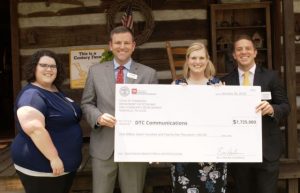News
Chamber Seeks More Financial Support from City
June 16, 2018
By: Dwayne Page
The Chamber of Commerce would like to have more financial support from the City of Smithville and the DeKalb County government in its mission of promoting the county and tourism.
The County makes an annual contribution of $17,500 to the Chamber while the City of Smithville adds $10,000. But that ranks far below what other counties in the Upper Cumberland Region donate to their Chambers of Commerce.
During a budget work session Thursday evening, Chamber Director Suzanne Williams addressed the Smithville Mayor and Aldermen asking for a $5,000 increase in the city’s annual contribution. She plans to approach the county budget committee next week.
“I know there are so many important things but I am passionate about what I do. I love promoting this county. I ask that you consider making an extra contribution so I am not having to raise funds all the time,” said Williams.
To help support the operation of the Chamber, various fundraisers are held during the year. The chamber also has 160 members who pay membership dues averaging $135 each per year.
In her role as Chamber Director, Williams explained that she mainly promotes tourism and community development and supports the County Mayor, who is the county’s economic development director. Williams also represents DeKalb County as a member of 14 boards. “I think that is important because it helps us build relationships in the region and throughout the state,” said Williams
The local chamber is active, Williams continued and has been successful in helping secure grants in recent years, including for downtown revitalization. With grant funding through that particular program, participating property owners of commercial buildings on the public square, who also made a commitment of funding, have been able to make repairs and upgrades including painting, façade improvements, along with new awnings and signs. Williams said those grants have resulted in a half million dollars in improvements to downtown property owners.
Williams said the Chamber has also secured a developmental co-op grant for a new tourism video which has been prepared to help promote DeKalb County.
Of course, Center Hill Lake and the Smithville Fiddlers Jamboree are two of the county’s largest tourist attractions and Williams said officials of the Tennessee Department of Tourism have been supportive in making a special effort to promote them in more publications and magazines.
Next year, the National Model T Ford Club of America is planning to make a stop in downtown Smithville on its national tour bringing 400-600 people to town to show off their Model T’s.
Tourism is big business in DeKalb County. Last year, Williams said tourists spent $45 million here, a 5.4% increase from the previous year. It was also the 3rd largest percentage increase in state.
Yet, while DeKalb County is among the leaders in regional tourism dollars, other counties in this area are doing more to support their Chambers.
According to Williams, the Sparta-White County Chamber of Commerce receives $30,000 from the county there and $30,000 from Sparta along with proceeds from a Hotel-Motel tax.
The Carthage-Smith County Chamber receives $56,117 from the city and county combined there.
The Smithville Mayor and Aldermen were non-committal on more funding for the Chamber. They are still working toward preparation of the city budget for 2018-19 and will act on 1st reading passage of it Thursday night, June 21 at 6 p.m. at city hall.
DTC Presented $1.7 Million Broadband Grant
June 16, 2018
By: Dwayne Page
In January of this year, DTC Communications was awarded a $1.725M grant to make more high-speed broadband Internet available to rural Tennesseans. On Friday, June 15, officials from the State of Tennessee made the presentation of the grant funds to DTC CEO, Chris Townson, during a special ceremony.
The presentation was made at Haley Farms, located on Haley Road in Watertown. Amanda Martin, Broadband Director for the Tennessee Department of Economic and Community Development (TNECD), Crystal Ivey, Broadband Grant Program Manager, and Sammie Arnold, Assistant Commissioner of Strategy and Legislative Affairs made the presentation at the ceremony, which included comments from Townson and Martin, as well as various state and local officials in attendance. Haley Farms owner, Bob Haley, also led attendees in the Pledge of Allegiance.
“DTC Communications exists to improve the quality of life for our members and the region we serve,” stated CEO Chris Townson. “Receiving this grant from the TNECD allows DTC to extend the reach of our mission to serve the unserved and underserved in portions of Wilson and Smith Counties. DTC’s new fiber optic network in the grant areas means enhanced E-Connectivity, which is the foundation for better education, entertainment, economic development, government, business and more – DTC Fiber means opportunity.”
The grant is a product of Governor Bill Haslam’s Tennessee Broadband Accessibility Act, and was awarded by the Tennessee Department of Economic & Community Development.
“In communities across Tennessee, broadband is an essential service that will increase economic investment and growth to help businesses, families and individuals thrive,” Governor Haslam said, in announcing the grant recipients back in January. “With the assistance of these grants, underserved communities will now have access to broadband that will benefit not only the communities themselves, but the state as a whole. These grants are a step in the right direction for our state and will help Tennessee reach its full potential.”
DTC Communications serves residents in Cannon, DeKalb, Rutherford, Smith and Wilson counties. The grant covers areas near Plunkett Creek and Rawls Creek roads in Smith County and areas near Watertown in Wilson County.
“Having DTC’s broadband internet impacts not only individuals in Smith County, but the local economy as well,” said Smith County Mayor, Michael Nesbitt. “This grant is helping DTC extend fiber to several local residents in a completely unserved area. It is exciting that people without quality internet today will soon be connected with world-class gigabit service, meaning they will have access to emergency services, can do homework or classes online, seek out new jobs, or even work from home. This project matters to the people of Smith County. Thank you to the Department of Economic and Community Development, our state and local leaders, to DTC, and all that worked on this grant. It is a tremendous asset having a rural telecommunication cooperative in our community.”
“I’m so thankful for people like DTC, our Tennessee Economic Development, and county commissioners that fight for our rural area. With DTC’s investment and grant money received, this will make tremendous differences in the lives of our people,” said Wilson County Mayor, Randall Hutto. “This is a huge deal for Wilson County. I can’t thank the folks who’ve been involved with this enough. My hat’s off to them for making a difference in the lives of the individuals in Wilson County and in Smith County, so again thanks to DTC for what they’ve done to make this happen.”
With the TNECD grant, more than 800 residents, who currently do not have quality internet, will now have access to high speed fiber service.
“DTC is proud to have a long history of serving rural Tennesseans,” said Townson. “We are thankful for the opportunities this grant provides. The benefits of building a fiber optic network in this area will be experienced for generations to come.”
DTC Communications is a member owned telephone cooperative established in 1951. The cooperative supplies communication and entertainment products and services to residential and business customers primarily throughout Middle Tennessee.
Northside Summer School Students Present Play About Civil Rights Activist (VIEW VIDEO HERE)
June 15, 2018
By: Dwayne Page
Fourth and fifth grade summer school students at Northside Elementary School presented “The Unstoppable Ruby Bridges” Friday afternoon for the public.
The play was based on Ruby Nell Bridges Hall, an American civil rights activist, who was the first African-American child to desegregate the all-white William Frantz Elementary School in Louisiana during the New Orleans school desegregation crisis in 1960.
The play was directed by Teacher Alisha Day and produced by Teacher Kristy Lasser.
M2U02789 from dwayne page on Vimeo.
After the presentation a group of students performed a song about Dr. Martin Luther King, Jr. followed by second and third graders participating in a reader’s theater
« First ‹ Previous 1 2238 2328 2336 2337 23382339 2340 2348 2438 2504 Next › Last »










